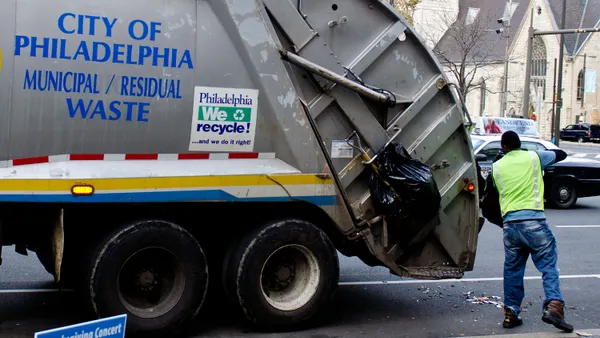While WasteExpo was kicking off this week in Las Vegas, many of the industry's top CEOs were cloistered upstairs in a big room talking shop all day. Each session at the sixth annual investor summit, led by Stifel's Michael E. Hoffman, contained a wealth of information Waste Dive will continue to unpack in the coming weeks. Here are some combined highlights from multiple sessions:
Recruitment & retention
- Waste Connections CEO Ron Mittelstaedt believes the decline in high school vocational programs and other technical training opportunities has limited the pipeline of potential candidates. He also believes a tighter legal immigration policy is bad for business, saying, "You want to create a real service industry problem, adopt a limited immigration plan."
- Waste Management CEO Jim Fish, both at the summit and a subsequent "fireside chat" the next day, said the industry can do more to embrace diversity and target candidates in populations with higher than average unemployment rates. An estimated 40% of the company's drivers are Latino and 20% are black. "Minorities make up the majority of our driver ranks, but do they make up the majority of our management ranks? Not even close," he said.
- Advanced Disposal Services CEO Richard Burke said a safer workplace can also make the industry more appealing. He believes automated technology for lane change alerts and other functions could help with that process, and said the company has experimented with driving simulators in certain markets.
Consolidation:
- Republic Services CEO Don Slager believes the industry has gotten better at efficiently executing big deals in the past 10 years — and that the market has rewarded this trend — so there could be more to come. "There are many high quality companies out there that we would love to own," he said. "From a regulatory perspective, there’s still plenty of room."
- Republic's team has also seen the average acquisition size get smaller, meaning that $25 million is now considered a large deal for them compared to what may have occurred in the past.
- Multiple companies touted the benefits of a well-placed tuck-in acquisition. For example, Casella Waste Systems' recent acquisition of Complete Disposal in western Massachusetts gave it rail transfer capacity for the first time and will enable movement through a wider disposal network.
Disposal:
- The trend of shrinking disposal capacity in certain markets like the Northeast was also a concern for executives. CEO John Casella said the "supply and demand imbalance" is growing and that exporting waste farther distances is "inappropriate." This is especially true for Massachusetts, where one of the company's landfills will be closing at the end of this year due to regulatory and community pressure.
- Fish said this trend of landfills being "regulated away" has affected every company at least once and that the industry needs to start thinking about what will happen after many sites reach capacity in coming decades.
- In his view, this will either mean building new landfills farther away from population centers or finding a new type of technology to fill the gap. Fish doesn't think maximizing current systems will necessarily be the solution. "I just don’t believe that single-stream recycling is the answer to landfills naturally coming to the ends of their lives," he said.
Recycling:
- There was a general consensus that China's import restrictions have led to a watershed moment for the industry's recycling activity. Mittelstaedt said he thinks the recycling model "is broken" and that "industry and politicians in conjunction are to blame for this."
- Fish reiterated the company's recent message about customers pushing "diversion" versus "recycling" being the problem, saying that it was time for not just more education but also enforcement. Burke said the industry has to become "much more dogmatic" about contract terms.
- All of this will likely lead to higher recycling costs, which some of the executives thought businesses would be more willing to pay than residents. "Americans are green. That means they like money. It doesn’t mean they’re gung-ho about recycling," said Mittelstaedt. "The vast majority of people they’ll pay a little, not a lot."
- What all of this will mean for recycling rates and disposal activity is still uncertain, but it's clear that the industry's leading CEOs see a prime opportunity to adjust the model. "While this is a tough thing to go through, it’s going to make the recycling business better," said Slager. "It’s, in the long scheme of our business, actually a really good thing."










